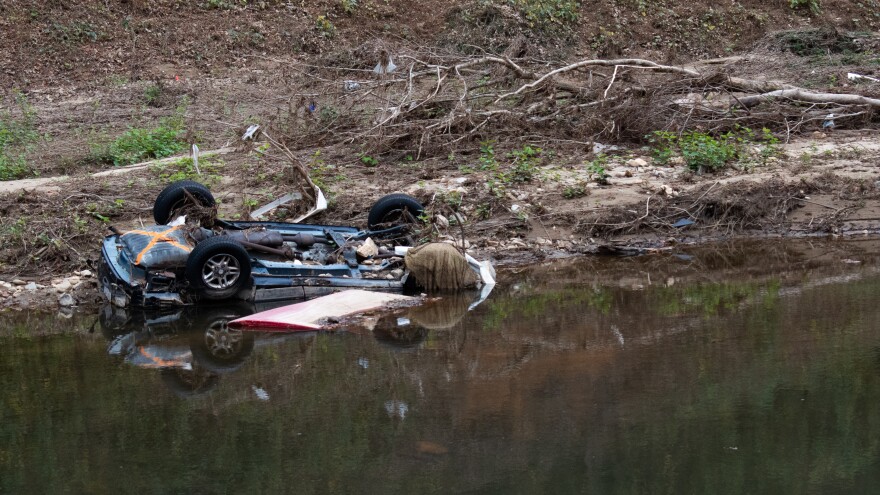A fleet of 10 boats sped toward Lake Norman State Park in late October. This was the first cleanup in the Central Catawba River Basin scheduled by the North Carolina Wildlife Federation after Hurricane Helene. The storm hit the northern basin just east of Asheville hard around the towns of Old Fort and Black Mountain.
Some debris floated miles downstream to Lake Norman, but much of what volunteers are finding came from flooding nearby. Organizations like the Catawba Riverkeeper are still assessing the damage.
Billy Wilson steered a boat into a cove. He’s a board member of the North Carolina Wildlife Federation and leader of the nonprofit’s Lake Norman chapter.

“When you start looking really closely at the shoreline, you realize how inundated with debris that it really is,” Wilson said.
One volunteer squatted down to lift a black box as tall as his waist. He hefted the dock float end over end like a CrossFit athlete flipping over a tire. It thudded dully on the sand and rubble.
Aisha Johnson held open a trash bag while her two daughters picked through woody debris with mechanical grabbers.
Johnson, like many volunteers who came out, lives near the Catawba and wanted to get involved.
“[The kids] love anything that’s different, that’s new, that’s exciting,” Johnson said. “And it involved a boat, so they were even more excited.”

More than 70 volunteers combed the shores for trash. Trees that appeared secure were left where they lay to become wildlife habitats.
Trees that aren’t anchored in place can threaten boats and swimmers. So, the Wildlife Federation contracted Lancaster Custom Docks to remove or reposition them with an excavator parked on the end of a barge.
The barge floated near the shore of one of Lake Norman’s 72 islands. They’ve become catchalls for much of the debris floating downstream. Billy Wilson watched from his boat.
“They’re gonna lift that tree and that rootball up and push it further up into the island’s shoreline,” Wilson said, “So that they lessen the likelihood that it will be a navigational hazard.”
John Lancaster wrapped a chain around a fallen tree and hitched it to the machine’s clawlike bucket. The excavator extended its arm and wrenched the rootball from the ground.
Duke Energy is offering $20,000 toward debris removal along the Catawba and contracted its own removals. The Wildlife Federation already expects their cleanup costs to more than double that figure. The state and federal governments have focused efforts on removing immediate hazards like spilled oil tanks from the river or larger debris like cars. Nonprofits and private groups have focused on the smaller or less pressing waste.
The state’s October relief package did not include funding to clean or restore North Carolina waterways impacted by Helene.
“In the menu of things we’re going to have to deal with, river cleanups are going to be an item,” said Republican Rep. Jay Adams, who represents parts of Hickory and Conover. “And it’s going to be an ongoing item.”
Adams said he didn’t think there would be sufficient information to include river restoration funds in the state’s November disaster relief package. That hasn’t stopped volunteer groups from acting, and cleanups have already started in the Central Basin around Charlotte, where the waters are safer to access and navigate. They’ll begin farther north at Lake James this weekend.

Cleanup efforts further upstream
“We’ve been doing some initial [water quality] testing with a little unsafe conditions on some of the rivers with the trees down and the high waters for the lake,” said Grant Buckner, the Catawba Riverkeeper’s Northern Basin director.
Fecal bacteria levels at Lake James have started dropping since the storm, but Buckner said that can change anytime there’s more rainfall.
Last week, he waded over matts of dead kudzu toward the derelict dam in the town of Old Fort, 30 minutes east of Asheville. The Catawba begins as a spider web of streams and creeks north of Old Fort and Black Mountain.
The stormswept mud crunched and cracked underfoot. Buckner said he was used to picking up trash like bottles and plastic bags — refuse people didn’t want anymore. Since Helene, a different kind of debris started washing up.

We climbed down an exposed root that led to the banks of the Catawba River. Sweatpants hung in a rootball from a downed tree. The cover of a children’s encyclopedia lay on a bed of dead kudzu. The back promised “strange but true facts” and over 2,000 color illustrations, but stormwater had hollowed out the book, leaving only the spine and covers.
“I guess some people might throw those out, but with just the household trash we’re seeing, it’s a lot different,” Buckner said.
During the past month, Buckner’s seen what the floodwaters took away from people: photos, clothing and other personal effects. He stepped over a muddy doll and a single shoe. The range of objects shows just how fast — and how strong — the river swelled. An overturned car rests, half-submerged, on the opposite bank.
“The power of water is just amazing, picking up buses and crunching ‘em like Coke cans,” Buckner said.

The northern Catawba River basin is just one of nine river basins across 25 counties severely impacted by Hurricane Helene. Some refuse will exit the rivers naturally, whisked away to the ocean over months and years, and vegetation will reclaim eroded banks.
“Rivers do recover,” Rep. Adams said. “It just takes a long time. This is going to require ongoing monitoring.”
But better to act quickly, according to American Rivers’ Erin Singer McCombs, if not only to remove waste from waterways before it reaches the ocean or breaks down too small to easily collect.
“Our economy is so rooted in recreation,” said McCombs, the nonprofit’s Southeast conservation director. “We can make the argument that it’s very important for the health of the river, that it needs to be free of this trash. But we also need to support the local community.”
Outdoor recreation is a nearly $5 billion industry in western North Carolina, according to a 2024 report from Appalachian State University. As more towns reopen, access to clean lakes and rivers will attract paddlers, hikers and anglers that help prop up local economies.
The volunteers at Lake Norman removed nearly 20 tons of trash from 2 miles of shoreline — a small dent in Lake Norman’s more than 500 miles of shoreline. The N.C. Wildlife Federation’s Tim Gestwicki says cleanups like this one will occur for the foreseeable future.
“It’s daunting. A staggering amount of debris,” Gestwicki said. “But the lake is starting to rally around it.”
Report debris or pollution online with the Catawba Riverkeeper. Another Lake Norman cleanup is scheduled for this weekend.


